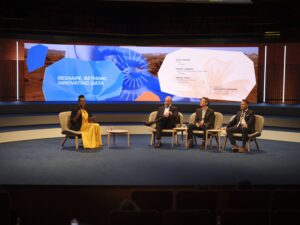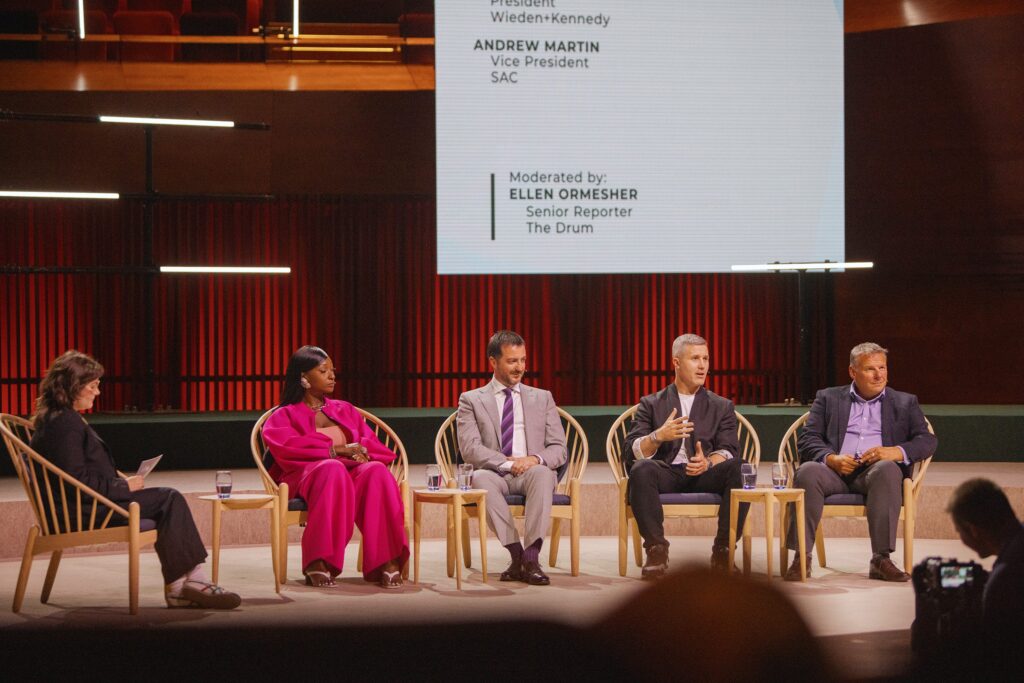
Dear Fashion: Let’s Step Up and Get Aligned
In a recent opinion editorial with WWD, CEO Colin Browne argues fashion needs to take more serious and coordinated action on sustainability. Read the highlights here!

Last month, Jeremy Lardeau, senior vice president of the Higg Index at Cascale, formerly the Sustainable Apparel Coalition, joined a panel at the Global Fashion Summit, in Copenhagen.
The discussion focused on deepening understanding on the complexities of quality waste, water, and greenhouse gas emissions reporting, as well as the role of collaboration to address this challenge. The importance of leveraging data insights to move the industry forward was key throughout.
Muchaneta ten Napel, founder and chief executive officer, Shape Innovate, moderated the panel session titled “Reshape, Rethink: Innovating Data.” In addition to Lardeau, the panel included Scott Raskin, CEO, Worldly, an impact intelligence platform and the exclusive platform for the Higg Index tools, and Atnyel Gued, chief product officer, Made2Flow.
Lardeau shared the broad and complicated nature of the industry and emphasized the critical role of data intelligence to drive progress across the fashion industry. He added that brands and retailers have sophisticated data intelligence to support revenue growth that can be used as a blueprint. Lardeau explained the complicated reality of carbon emission reduction and addressed the need for a different collective, pre-competitive approach. He emphasized the importance of data and intelligence for the industry to figure out how to deliver on the impacts of carbon reduction.
Lardeau noted the progress the industry has made in deepening alignment. “In five years we won’t talk about data, because it’s part of how we do business. What we will talk about is industry aligned action on specific, challenging measures that help us get to our climate ambitions.”
Scott Raskin, CEO, Worldly showcased the Facility Data Manager, the organization’s new tool geared toward enabling factories to track performance data monthly. He stressed the importance of environmental data disclosure, asserting, “Brands have to capture environmental data and they will need to report and disclose. This enforces the need to deploy tools. It’s not a choice.”
Finally, all three panelists called for the continued collaboration across the industry with Made2Flow’s Atnyel Gued asserting, “Don’t be afraid of your supply chain”.


At the Global Fashion Summit: Boston Edition 2023, Sustainable Apparel Coalition experts shared critical perspectives on supply chain innovation, policy, and building infrastructure for circularity. The Global Fashion Summit is a hallmark event for the Global Fashion Agenda (GFA), which had powered the SAC’s Annual Meeting in Boston the previous day. This year, GFA’s event explored the theme of “Ambition to Action.”
Elisabeth von Reitzenstein, SAC Senior Director, Public Affairs, joined a roundtable discussion moderated by María Luisa Martínez, GFA’s Public Affairs Director, on “Extended Producer Responsibility for Textiles on Both Sides of the Atlantic.” She shared her perspective on how, given the global textiles value chain, standardization is critical to EPR in the EU and U.S. In the EU, EPR was recognized as a critical piece of the EU Strategy for Sustainable and Circular Textiles and its specifications are currently under discussion following the recent adoption by the European Commission of the revision of the Waste Framework Directive. In the U.S., the California Senate Bill SB707, known as the Responsible Textile Recovery Act of 2023, aims to establish an EPR program for apparel, textiles, and textile articles, setting the stage for a first-ever national EPR program. “Voluntary policies have helped make real strides, but no industry can police itself,” von Reitzenstein said. Together with other participants in the roundtable, she reiterated the Policy Hub’s position on a need for harmonized and mandatory policies that ensure our industry is working towards the same ambitious goals. She also emphasized the great benefit of connecting with NGOs and specialized stakeholder organizations – such as PRO representatives – across the Atlantic to exchange best practices and drive effective advocacy campaigns.
Jeremy Lardeau, Vice President, Higg Index at the SAC, joined a panel on “Innovation for Value Chain Challenges” that addressed AI-driven impact on consumer choices to reducing textile waste and production inefficiencies, as well as how data development can offer solutions to fashion’s supply chain challenges. Participating speakers also included Anabel Maldonado, Founder and CEO of PSYKHE AI, and Beth Esponnette, Chair, Co-Founder and CPO of unspun; the panel was moderated by Christina Iskov, Head of Innovation and Academy at GFA. Lardeau shared his perspective on AI in terms of historical technology trends, highlighting the Higg Index suite of tools as a model for how sustainability analytics can help support and drive the sustainability agenda across the industry. “These tools have matured into comprehensive, robust offerings ready to scale and form a template for our industry’s pursuit of impact improvements. Nonetheless, they will continue to evolve, as science improves and our understanding of the industry’s challenges deepen, allowing us to support our members and the industry,” Lardeau said.
Joël Mertens, SAC’s Director of Higg Product Tools, discussed “The Global Approach to Circularity” at a panel discussion that also included Masarrat Quader Syeda, Public Affairs and Stakeholder Engagement Manager at H&M Group, Sarah Coulter, Director of Special Projects at Accelerating Circularity, and Mumit Hasan, Director Business and Operations, Bangladesh at Reverse Resources, moderated by Holly Syrett, GFA’s Impact Programmes and Sustainability Director. Mertens weighed in on the importance of looking at circularity through its own lens rather than a part of a carbon strategy and the need to start designing for circularity now to enable the development of scalable solutions.